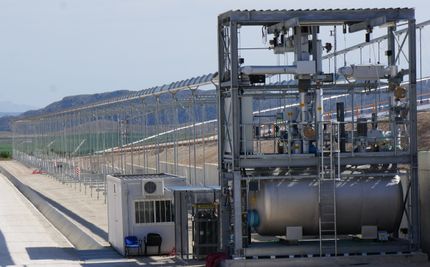Molten Salts for Efficient Solar Thermal Plants
Advertisement
Researchers from Siemens intend to substantially boost the efficiency of solar thermal power plants and thus reduce the costs of this climate-neutral method of power generation. They intend to use mixtures of molten salts as heat transfer media in the High Performance Solar Thermal Power project. In conjunction with partners, scientists from Siemens will construct a pilot plant in Portugal and test the use of molten salt mixtures in parabolic trough power plants.
This type of power plant uses concave parabolic mirrors that focus sunlight on an absorber tube at the mirrors’ focus. A heat transfer medium flows along the tube. The heat is transferred to a conventional water-steam cycle in a downstream steam generator, where it is converted into electricity by a steam turbine and a generator. The main factor determining the efficiency of the power generation process is the maximum working temperature of the heat transfer medium. As this temperature increases, the utilization of the steam turbine approaches its optimum value.
Siemens intends to use molten salts instead of thermal oil, thereby increasing the working temperature from 400 to more than 500 degrees Celsius. Eliminating the use of thermal oil would also prove beneficial as it has a relatively high vapor pressure and is highly flammable. Salts suitable for use as heat transfer media consist of, for example, a mixture of sodium and potassium nitrates. These are non-flammable and have almost zero vapor pressure. As a result, the plant can be operated without pressure—and that means more safely. Furthermore, salts have a higher heat storage capacity than thermal oil and are considerably cheaper. The solidification temperature of the salt previously used for this purpose must, however, be reduced from the current temperature of approximately 220 degrees to less than 150 degrees Celsius so that it doesn’t “freeze” overnight. Optimizing the composition of the salt mixture and thus its physical properties is an important goal being pursued by scientists from Siemens Corporate Technology and from Siemens Energy.
The pilot plant will be constructed on the grounds of the University of Evora, Portugal. The solar components, the steam generator system, the pipework system, and the pumps will be adapted to cope with the higher temperatures and the properties of the molten salt mixture. The researchers will use the results gained to plan, and implement verification procedures at, commercial facilities with installed powers in excess of 50 megawatts. The project is being funded by Germany’s Federal Ministry for the Environment. The participants include the German Aerospace Center (DLR) and other companies.






























































